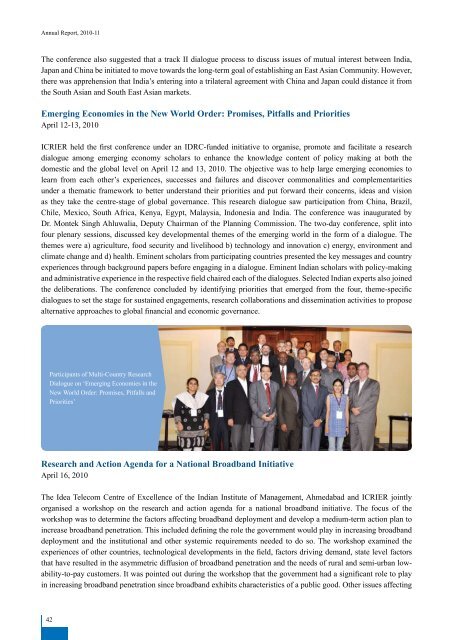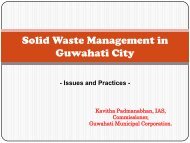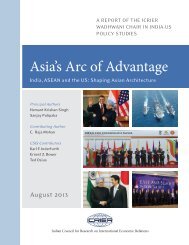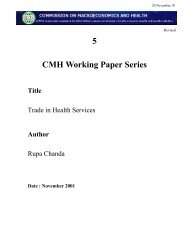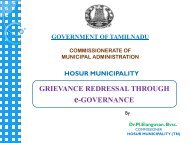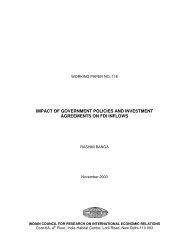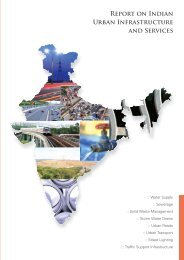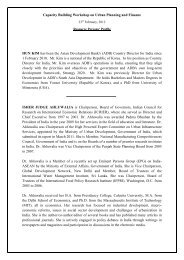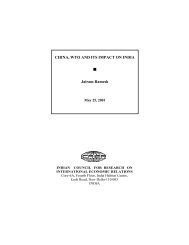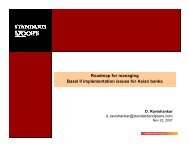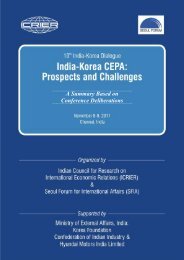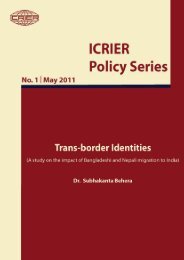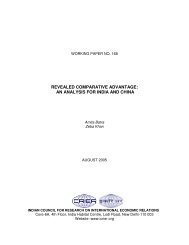You also want an ePaper? Increase the reach of your titles
YUMPU automatically turns print PDFs into web optimized ePapers that Google loves.
<strong>Annual</strong> <strong>Report</strong>, 2010-11<br />
The conference also suggested that a track II dialogue process to discuss issues of mutual interest between India,<br />
Japan and China be initiated to move towards the long-term goal of establishing an East Asian Community. However,<br />
there was apprehension that India’s entering into a trilateral agreement with China and Japan could distance it from<br />
the South Asian and South East Asian markets.<br />
Emerging Economies in the New World Order: Promises, Pitfalls and Priorities<br />
April 12-13, 2010<br />
ICRIER held the first conference under an IDRC-funded initiative to organise, promote and facilitate a research<br />
dialogue among emerging economy scholars to enhance the knowledge content of policy making at both the<br />
domestic and the global level on April 12 and 13, 2010. The objective was to help large emerging economies to<br />
learn from each other’s experiences, successes and failures and discover commonalities and complementarities<br />
under a thematic framework to better understand their priorities and put forward their concerns, ideas and vision<br />
as they take the centre-stage of global governance. This research dialogue saw participation from China, Brazil,<br />
Chile, Mexico, South Africa, Kenya, Egypt, Malaysia, Indonesia and India. The conference was inaugurated by<br />
Dr. Montek Singh Ahluwalia, Deputy Chairman of the Planning Commission. The two-day conference, split into<br />
four plenary sessions, discussed key developmental themes of the emerging world in the form of a dialogue. The<br />
themes were a) agriculture, food security and livelihood b) technology and innovation c) energy, environment and<br />
climate change and d) health. Eminent scholars from participating countries presented the key messages and country<br />
experiences through background papers before engaging in a dialogue. Eminent Indian scholars with policy-making<br />
and administrative experience in the respective field chaired each of the dialogues. Selected Indian experts also joined<br />
the deliberations. The conference concluded by identifying priorities that emerged from the four, theme-specific<br />
dialogues to set the stage for sustained engagements, research collaborations and dissemination activities to propose<br />
alternative approaches to global financial and economic governance.<br />
Participants of Multi-Country Research<br />
Dialogue on ‘Emerging Economies in the<br />
New World Order: Promises, Pitfalls and<br />
Priorities’<br />
Research and Action Agenda for a National Broadband Initiative<br />
April 16, 2010<br />
The Idea Telecom Centre of Excellence of the Indian Institute of Management, Ahmedabad and ICRIER jointly<br />
organised a workshop on the research and action agenda for a national broadband initiative. The focus of the<br />
workshop was to determine the factors affecting broadband deployment and develop a medium-term action plan to<br />
increase broadband penetration. This included defining the role the government would play in increasing broadband<br />
deployment and the institutional and other systemic requirements needed to do so. The workshop examined the<br />
experiences of other countries, technological developments in the field, factors driving demand, state level factors<br />
that have resulted in the asymmetric diffusion of broadband penetration and the needs of rural and semi-urban lowability-to-pay<br />
customers. It was pointed out during the workshop that the government had a significant role to play<br />
in increasing broadband penetration since broadband exhibits characteristics of a public good. Other issues affecting<br />
42


